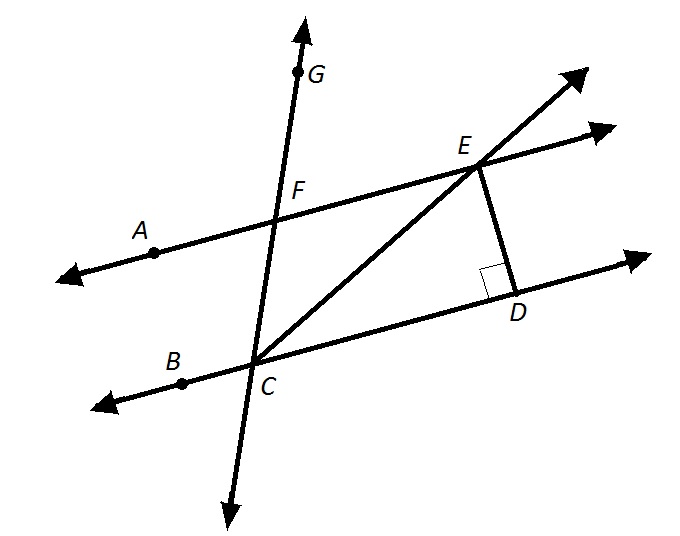All GED Math Resources
Example Questions
Example Question #1 : Angles
What is the measure of each angle of a regular octagon?
The sum of the degree measures of the angles of a polygon with 


Each angle of a regular polygon has equal measure, so divide this by 8 to get the measure of one angle:

Example Question #2 : Angles
Give the measure of each interior angle of a regular 72-sided polygon.
A regular polygon with 


Example Question #2 : Angles

Refer to the above diagram.
Which of these is a valid alternative name for 
When naming an angle after three points, the middle letter must be its vertex, or the point at which its sides meet - this is 





An alternative name for this angle must be one of two things:
It can be named only after its vertex - that is, 


It can be named after three points. Again, the middle letter must be vertex 


The only possible choice is 
Example Question #3 : Angles

Note: Figure NOT drawn to scale.
The above hexagon is regular. What is 
Two of the angles of the quadrilateral formed are angles of a regular hexagon, so each measures

The four angles of the quadrilateral are 


Example Question #2 : Angles

The above octagon is regular. What is 
Three of the angles of the pentagon formed are angles of a regular octagon, so each measures

The five angles of the pentagon are 


Example Question #3 : Angles

Note: Figure NOT drawn to scale.
Refer to the above figure. 

Evaluate 
First, we find 
By angle addition,











The degree measures of three angles of a triangle total 
Example Question #4 : Angles

Refer to the above figure, which shows Square 

Evaluate 
By angle addition,






Example Question #5 : Angles

Refer to the above figure. 

Evaluate 
By angle addition,





Therefore,

Example Question #31 : Other Shapes
Give the number of sides of a regular polygon whose interior angles have measure 
The easiest way to solve this is to look at the exterior angles, each of which have measure 



The polygon has 36 sides.
Example Question #3 : Angles
Three consecutive even angles add up to 
Let 

Set up an equation such that all angles added equal to 180.
Divide by three on both sides.
The second largest angle is 
Substitute the value of 
The answer is:
Certified Tutor
Certified Tutor
All GED Math Resources








































































